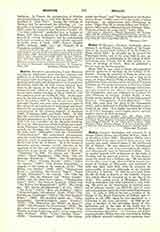

Molitor , WILHELM (pseudonyms, ULRIC RIESLER and BENNO BRONNER), poet, novelist, canonist and publicist, b. at Zweibruecken in the Rhine Palatinate, August 24, 1819; d. at Speyer, January 11, 1880. After studying philosophy and jurisprudence in Munich and Heidelberg (1836-40), he held various juridical positions in the service of the State from 1843-9. But feeling himself called to the priesthood, the pious young jurist studied theology at Bonn (1849-51) and was ordained priest on March 15, 1851. In the same year he became secretary to Bishop Weis of Speyer; on November 11, 1857, he was elected canon of the cathedral chapter and, soon after, appointed custos of the cathedral, and professor of archaeology and homiletics at the episcopal seminary. He took part in the consultations of the German bishops at Bamberg (1867), Würzburg (1868), and Fulda (1869). In 1868 Pius IX summoned him to Rome as a consultor in the labors preparatory to the Vatican Council. From 1875-7 he was a member of the Bavarian Landtag. He was the chief promoter of the Catholic movement in the Palatinate, and advanced the Catholic cause especially by founding the “Pfalzicher Pressverein”, the daily paper “Rheinpfalz” and the “Katholische Vereinsdruckerei”. His pronounced ultramontane principles made him unacceptable to the Bavarian Government, which in consequence repeatedly prevented his election to the See of Speyer. He is the author of numerous poems, dramas, novels, sketches on the questions of the day, and a few juridical treatises. A collection of his poems was published in 1884; his “Domlieder” in 1846. His dramas are: “Kynast” (1844); “Maria Magdalena” (1863, 1874); “Das alte deutsche Handwerk” (1864); “Die Freigelassene Neros” (1865); “Claudia Procula” (1867); “Julian der Apostat” (1867); “Des Kaisers Guenstling”, a tragedy of the times of the martyrs (1874); “Die Blume von Sicilien” (1880, 1897); “Dramatische Spiele”, containing the dramatic legend “Sankt Ursulas Rheinfahrt”, the comedy “Die Villa bei Amalfi”, and the dramatic tale “Schon Gundel” (1878); and his three festive plays,—”Weihnachtsbaum” (1867), “Das Haus zu Nazareth” (1872), and “Die Weisen des Morgenlands” (1877). His novels are: “Die schone Zweibruckerin”, 2 vols. (1844); “Der Jesuit” (1873); “Herr von Syllabus” (1873); “Memoiren eines Todtenkopfs”, 2 vols. (1875); “Der Caplan von Friedlingen” (1877); “Der Gast im Kyff-hausel.” (1880). His juridical works are: “Ueber kanonisches Gerichtsverfahren gegen Cleriker” (1856); “Die Immunitat des Domes zu Speyer” (1859); “Die Decretale Per Venerahilem” (1876). He also wrote three volumes of sermons (1880-2); “Das ‘Theater in seiner Bedeutung and in seiner gegenwartigen Stellung” (1866); “Ueber Goethes Faust” (1869); “Brennende Fragen” (1874); “Die Gross-macht der Presse” and “Die Organisation der Katholischen Presse” (1866); and a few other works of minor importance. In collaboration with Huelskamp he wrote “Papst Pius IX in seinem Leben and Wirken”, 4th ed. (1875) and in collaboration with Wittmer”Rom, Wegweiser durch die ewige Stadt” (1866, 1870).
MICHAEL OTT

